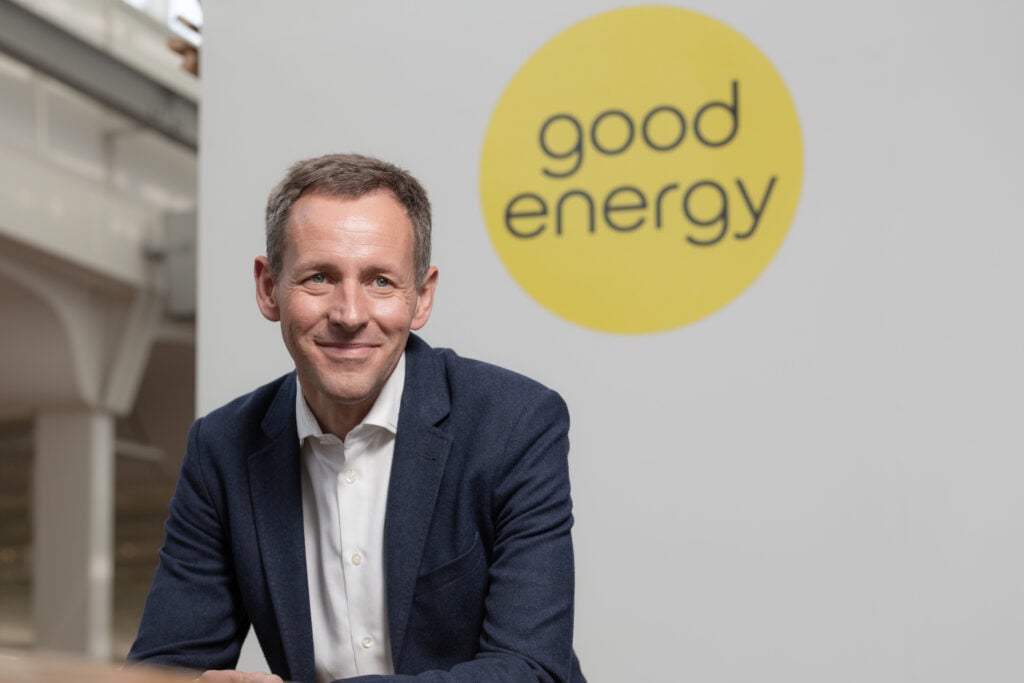Good Energy is renewing its focus on decentralised energy and mobility as its financial results show it has now become debt free on a net basis due to the sale of its generating portfolio.
The green energy supplier highlighted how the sale proceeds of this transaction – which completed in January 2022 for a total consideration of £21.2 million – provide a balance of growth capital and buffer to the volatile wholesale energy market.
As of February 2022, Good Energy has a cash position of £19.6 million, with the company stating it is to shift its capital allocation towards growth and investment while maintaining a strong balance sheet.
Its results show that its gross profit for the year to 31 December 2021 decreased 8.6% compared to the year prior, falling from £29.6 million to £27 million. It had a gross profit margin of 18.5%, meanwhile, down on the 22.6% of 2020
This was driven by the current energy crisis and quadrupling of the wholesale market price, according to the company.
Revenue for the year increased 11.8% to £146 million, with this driven by significant price rises throughout the year in response to rising wholesale costs.
Reported basic loss per share decreased to -21.8p compared to 0.9p in 2020, while basic underlying earnings per share from continuing operations increased to 13.2p from 0.9p
The company said it remains well hedged for summer 2022, with plans to increase incrementally hedging for winter 2022.
“In 2021, 28 energy supply companies failed, hitting customers’ bills and their trust in the industry. This was the result of both poor business practices and the UK’s continued reliance on volatile global fossil fuel markets,” Nigel Pocklington, CEO of Good Energy, said.
While Pocklington referenced the suite of measures announced by the government to address rising energy bills, he said the long-term solution remains investing in renewable technologies and a greener energy system.
“With fewer suppliers in the market, this leaves greater scope for prudent operators like Good Energy to continue driving innovation across the sector.”
The green energy supplier has today (29 March) announced an aim of supporting one million homes and businesses in cutting carbon from their energy and transport use by 2025.
Looking ahead, Good Energy’s focus is to be on decentralised energy, with the company to give this a renewed focus. It will build new propositions for customers to generate their own clean power in their homes and businesses.
Focus, too, will be on mobility, with Good Energy stating that its subsidiary Zap-Map has an over 70% share of the UK EV driver market. New services were also launched under the Zap-Map brand in 2021, including paid subscriptions, while new payment platform partners came on board and a partnership with fleet operator Fleetcor was signed.
Registered Zap-Map users increased 125% to 350,000 during 2021, while mapping data includes 95% of the UK’s public chargepoints on its network. Zap-Pay also now has nine chargepoint operators signed up and 25% of the rapid charging market.
Good Energy is intending to participate in Zap-Map’s current Series A funding round.
The energy supplier said its smart meter rollout is also “progressing well”, with almost 22,000 installed in 2021, which it said was in line with expectations.
Its customer numbers have also increased by 2.1% to 277,300. However, Good Energy said that the current market volatility has caused the company to pause some of its more acquisitive customer ambitions in the short term.
This volatility saw ScottishPower last week announce it is to exit the industrial and commercial market, citing the “unprecedented challenges” currently being faced by energy suppliers.
In its results today, Good Energy also referenced the “significant market challenges”, but said it has achieved a resilient performance during the year.
Meanwhile, SSE today also spoke of “turbulent” market conditions as it announced an upgraded its 2021/22 adjusted earnings per share. These are now expected to be in the range of 92p to 97p compared to the previous guidance of 90p.
SSE said that weather conditions have meant that its shortfall in output from renewable sources has decreased from 19% below plan for the nine months to 31 December 2021, to around 12% below plan as at 22 March. Additionally, it said that good performance from flexible thermal and hydro plant has continued in volatile market conditions, with these all resulting in the update to its adjusted earnings per share.





